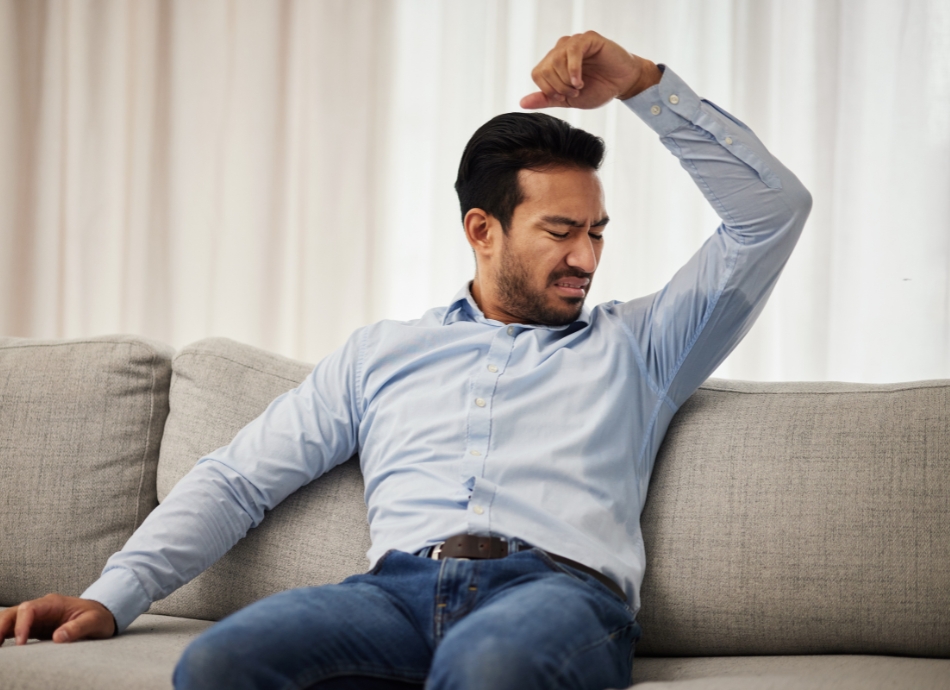Body odour
Also known as BO or bromhidrosis
Key points about body odour or BO
- Body odour (BO) is normal but can be unpleasant to smell.
- It's caused by bacteria on the skin breaking down sweat so it's often linked with excessive sweating.
- Common causes include exercise, being hot, or feeling nervous, anxious or stressed. Poor hygiene, infections, hormonal changes, diet or medicines, and some medical conditions can also cause BO.
- BO is a common problem, which you can usually treat yourself.
- If you have severe body odour, changes in body odour and/or excessive sweating, see your healthcare provider.

While BO can affect anyone, it’s more common in adults than children. This is because sweat glands don’t become active until puberty. Body odour tends to affect men more than women (as they have more body hair) and it can be more of a problem in hot, humid climates. Some studies suggest it’s more common amongst Europeans and Africans than Asians.
Sweating is normal and is an important part of your body’s processes. Sweat doesn’t smell until bacteria on your skin mixes with it. Our skin is naturally covered in bacteria to help stop other harmful organisms grow.
There are 2 main sweat glands in your body, known as the eccrine and apocrine glands.
- Eccrine glands are all over your body and release fluids onto your skin’s surface when your body temperature rises, to cool you down. This sweat doesn’t normally smell.
- Apocrine glands are found in places where you have hair, eg, your armpits and groin. When you’re stressed, these glands release a special fluid, which doesn’t smell until it combines with bacteria on your skin.
You can sweat but not have BO or have BO without sweating a lot. This all depends on the type of bacteria on your skin and how it breaks down the protein molecules in your sweat. The process of bacteria breaking down sweat can produce a strong odour that can smell sweet, sour or have a particular smell, eg onions.
Other causes of body odour
- A condition called hyperhidrosis (excessive sweating).
- Poor body hygiene, eg, not washing properly or often enough, not washing clothes regularly.
- Diet – some foods can change the way you smell (eg, as garlic and onions break down in your body, they can release a smell that comes out through your pores).
- Skin infections.
- Some medicines, eg, penicillin.
- Medical conditions, including obesity, diabetes, liver disease, kidney disease.
Body odour can also be linked to smelly feet and bad breath. Read more about foot odour(external link) and bad breath.
Body odour is common and can usually be easily treated at home.
Do:
- Wash your body thoroughly with antibacterial soap at least once a day, paying attention to armpits, groin and feet. Dry yourself thoroughly.
- Shave or trim your armpit hair so sweat can evaporate quicker and bacteria can’t grow in the hair.
- Use antiperspirants to reduce sweating and deodorants to mask any odour.
- Wash and change your clothes regularly, especially if you live in a hot climate, exercise or sweat a lot.
- Use armpit shields to protect your clothing from sweat.
- Try to choose natural fabrics like linen, cotton, wool and silk.
- Wear clean socks or open sandals.
- Find ways to reduce stress to reduce the sweat made by your apocrine glands.

Image credit: Canva
Don’t:
- Drink too much alcohol or coffee.
- Eat lots of spicy or strong-smelling food. Foods likely to add to BO include onions, garlic, cabbage, broccoli, cauliflower and red meat.
Talk to your local pharmacist
There are some things your pharmacist can help you with:
- antiperspirants that reduce sweating
- foot powders or sprays for sweaty feet
- antibacterial cleansers.
Talk to your healthcare provider
You should talk to your healthcare provider if:
- your body odour isn’t getting better after treating it yourself
- you’re sweating much more than usual
- you’re sweating even when it’s not hot and you haven’t been active
- you notice a change in how your body odour smells.
Treatments your healthcare provider might suggest for severe body odour and excessive sweating (hyperhidrosis) include:
- strong antiperspirants
- injections of Botox in your armpits to reduce the amount you sweat
- surgery to block or remove sweat glands.
If your sweating is caused by another condition, treatment will depend on the cause.
What’s that smell? Get rid of body odor(external link) Harvard Health, US
References
- Body odour (BO)(external link) NHS, UK, 2021
- Bromhidrosis(external link) Dermnet NZ, 2021
- Sweating and body odor(external link) Mayo clinic, US, 2021
- What’s that smell? Get rid of body odor(external link) Harvard Health, US, 2021
- Body odor(external link) Cleveland Clinic, US, 2022
Credits: Healthify editorial team. Healthify is brought to you by Health Navigator Charitable Trust.
Reviewed by: Healthify editorial team.
Last reviewed:





